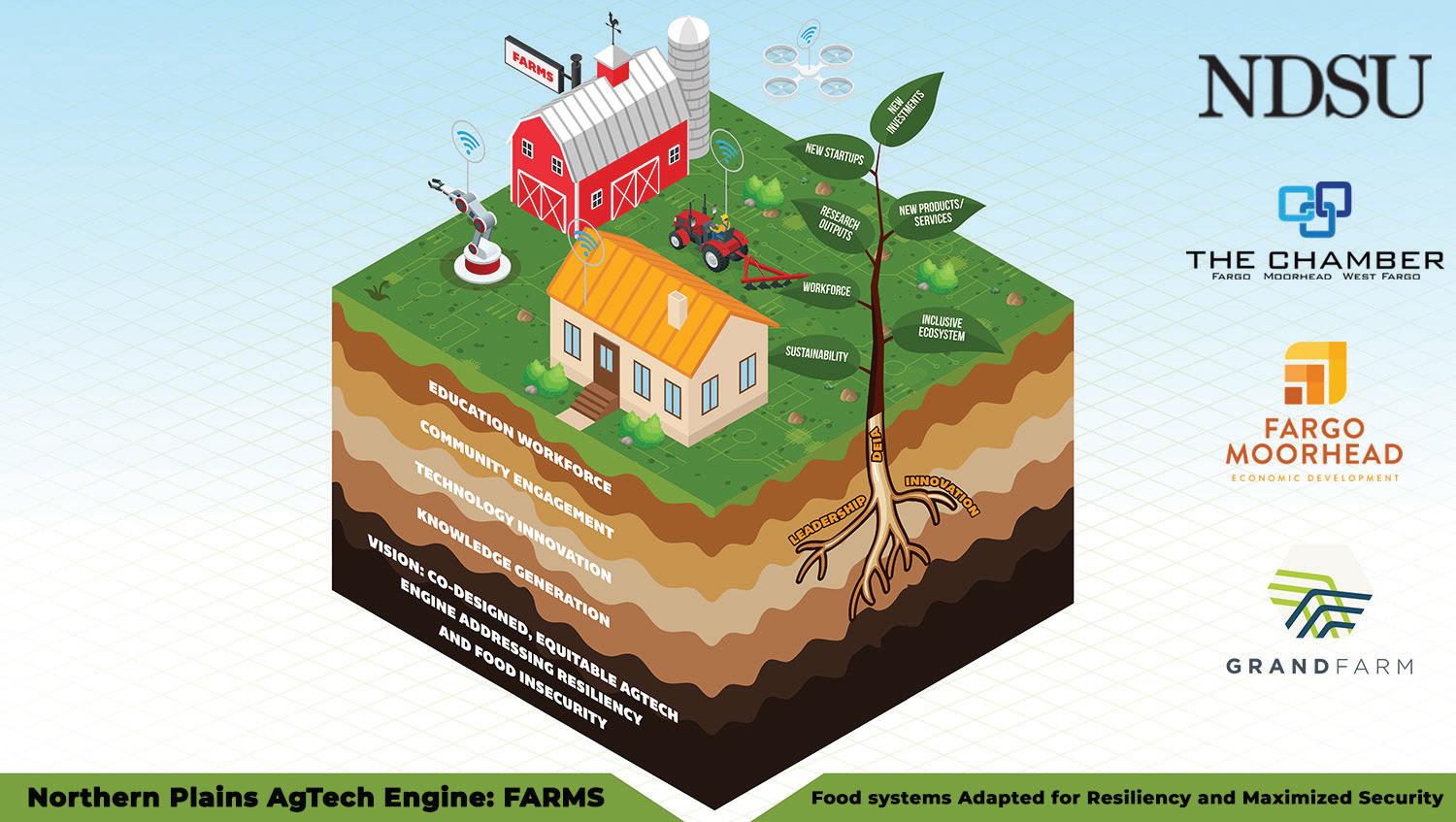
2 minute read
CHAMBER FOUNDATION
Innovative Partnership
An initiative to transform ag economic development and solve global food challenges
The Chamber is participating in a groundbreaking AgTech innovation partnership.
The Chamber is joining forces with NDSU, Grand Farm and the Greater Fargo Moorhead Economic Development Corporation (GFMEDC) to be the Northern Plains AgTech Engine for Food Systems Adapted for Resiliency and Maximized Security (FARMS).
On June 14, The National Science Foundation (NSF) announced that FARMS is one of 34 semifinalists in the competition from an original pool of 188 projects that span nearly all key technology areas and societal and economic challenges highlighted in the CHIPS and Science Act.
The primary objective of the FARMS proposal is to optimize and leverage the existing agricultural opportunities and the AgTech ecosystem in North Dakota to best address global food challenges. The project will work to offset a diminishing agricultural workforce by improving farming efficiencies, maintaining/increasing yields, reducing environmental impacts and enhancing ecosystems services.
Submitted in early 2023, the proposal aims to accelerate economic development in agriculture while focusing on issues such as food security and production for a rapidly growing global population. Partnerships, including those with North Dakota higher education institutions, are featured prominently and include United Tribes Technical College (UTTC) and Nueta Hidatsa
Sahnish College from the North Dakota Tribal College System (NDTCS); University of North Dakota, Bismarck State College and North Dakota State College of Science from the North Dakota University System (NDUS). Private sector and government partnerships were also key components of the project.
Executive Director of The FMWF Chamber Foundation, Jenna Mueller, is co-lead for education and workforce development on the project and brings expertise running the federal Good Jobs Challenge. “Our region boasts a wealth of AgTech Innovation pioneers, yet the prospect of nurturing and propelling their expertise, while equipping present and upcoming talents to become global frontrunners, is truly exhilarating. This endeavor will not only bolster North Dakota’s workforce and economic development but also cement its position as a leading force in the AgTech landscape,” Mueller said. “The project’s inclusive vision will lead to equitable agricultural opportunities for New Americans, Tribal citizens, veterans and others.”
Joining Mueller as co-lead in this area is NDSU Professor and Chair of NDSU Agricultural and Biosystems Engineering, Leon Schumacher.
Grand Farm Director Brian Carroll and GFMEDC Chief Business Development Officer Ryan Aasheim are co-leading stakeholders and partnerships. NDSU Professor and genomicist Phillip McClean will serve as the Research and Development lead. ND EPSCoR Executive Director Jolynne Tschetter will lead the process of working with industry partners on commercializing research. NDSU Associate Professor Hollie Mackey and NDSU Director of Tribal Partnerships Sheridan McNeil will co-lead the involvement of Tribal Colleges, Universities and Tribal communities, incorporating best practices to integrate and reinforce this connection at all levels.
The NSF’s Engines program is designed to catalyze and foster innovation ecosystems throughout the U.S. Its goals include advancing critical technologies; addressing national and societal challenges; cultivating partnerships among industry, academia, government, nonprofits, civil society and communities of practice; promoting economic growth and job creation; and fostering regional innovation and talent. Engines support use-inspired research, translating innovation into practice and workforce development while prioritizing diversity, equity, inclusion and accessibility.
Interested in partnering with FARMS?
Reach out to foundation@ fmwfchamber.com
Prior to the legislative session, The Chamber hosted multiple meetings with members, local elected officials, and key business and community leaders to identify and develop strategies to ensure our region’s top opportunities and challenges were at the forefront of this legislative session.
This session, The Chamber spent considerable time at the Minnesota Capitol advocating for these priorities, building relationships, meeting with elected officials and lobbying on behalf of the Clay County area and our business community. The Chamber’s top priorities for the Minnesota Legislative Session are listed on the next page.
#FMWFAdvocacy










